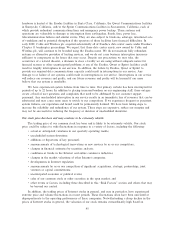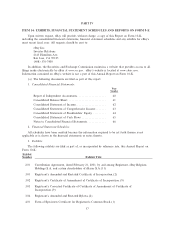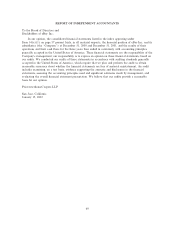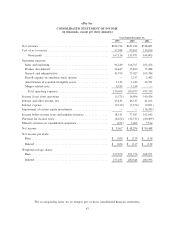eBay 2001 Annual Report Download - page 57
Download and view the complete annual report
Please find page 57 of the 2001 eBay annual report below. You can navigate through the pages in the report by either clicking on the pages listed below, or by using the keyword search tool below to find specific information within the annual report.employees and contractors, and nondisclosure agreements with parties with whom we conduct business in
order to limit access to and disclosure of our proprietary information. These contractual arrangements and
the other steps taken by us to protect our intellectual property may not prevent misappropriation of our
technology or deter independent third-party development of similar technologies. We pursue the
registration of our domain names, trademarks and service marks in the U.S. and internationally. EÅective
trademark, copyright, patent, trade dress, trade secret and domain name protection is very expensive to
maintain and may require litigation. Protection may not be available in every country in which our services
are made available online. Furthermore, we must also protect our trademarks, patents and domain names
in an increasing number of jurisdictions, a process that is expensive and may not be successful in every
location. We have licensed in the past, and expect to license in the future, certain of our proprietary rights,
such as trademarks or copyrighted material, to third parties. These licensees may take actions that might
diminish the value of our proprietary rights or harm our reputation. We also rely on certain technologies
that we license from third parties, such as Oracle Corporation, IBM, Microsoft and Sun Microsystems,
Inc. These third-party technology licenses may not continue to be available to us on commercially
reasonable terms. The loss of these technologies could require us to obtain substitute technologies of lower
quality or performance standards or at greater cost.
Some anti-takeover provisions may aÅect the price of our common stock.
The Board of Directors has the authority to issue up to 10,000,000 shares of preferred stock and to
determine the preferences, rights and privileges of those shares without any further vote or action by the
stockholders. The rights of the holders of common stock may be harmed by the rights of the holders of
any preferred stock that may be issued in the future. Some provisions of our certiÑcate of incorporation
and bylaws could have the eÅect of making it more diÇcult for a third-party to acquire a majority of our
outstanding voting stock. These include provisions that provide for a classiÑed board of directors, prohibit
stockholders from taking action by written consent and restrict the ability of stockholders to call special
meetings. We are also subject to provisions of Delaware law that prohibit us from engaging in any business
combination with any interested stockholder for a period of three years from the date the person became
an interested stockholder, unless certain conditions are met. This restriction could have the eÅect of
delaying or preventing a change of control.
53
























